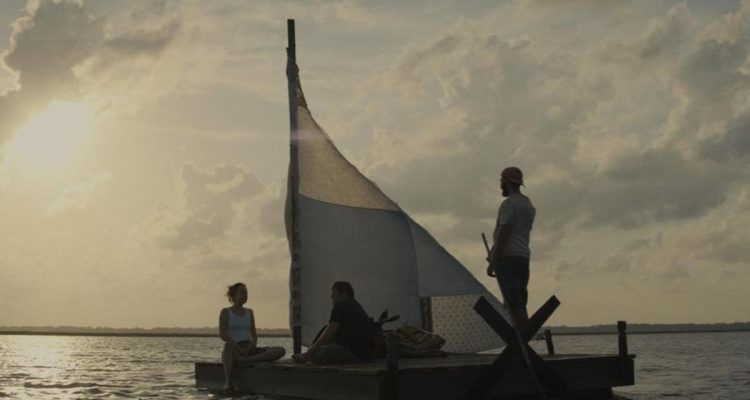The definition of family is not beholden to the idea of blood. Like anyone, blood relatives are completely susceptible to being rotten individuals, regardless of who they are providing for. The people who look after you are your family. Not unlike Hirokazu Kore-eda’s recent and beloved “Shoplifters,” Tyler Nilson and Mike Schwartz’s deeply-moving “The Peanut Butter Falcon” tackles the idea of finding beautiful familial relationships in unexpected places to fill that void in the heart.
Zak (Zack Gottsagen) is a 22-year-old young man with down syndrome. His parents have abandoned him, and they only place the state could find with room to take care of him is in a retirement home. He spends his time plotting to escape and re-watching an old wrestling instructional video on VHS by his idol, Clint “The Salt Water Redneck” (Thomas Haden Church). When Zak does manage to escape with the help of another patient (Bruce Dern), he runs and finds shelter in a boat, which unbeknownst to him belongs to Tyler (Shia LaBeouf), a crab fisherman wrangling with the guilt of the death of his friend Mark (Jon Bernthal, only appearing in flashbacks). That guilt and anger – along with a debt to pay – leads him to burn $12,000 worth of fishing equipment belonging to Duncan (John Hawkes) and Ratboy (Yelawolf). Tyler needs to get as far away as possible, while Zak is attempting to make it to Clint’s wrestling school advertised on his beloved video. Like Tom Sawyer and Huck Finn, the two band together on the run while being pursued by Tyler’s enemies, as well as Eleanor (Dakota Johnson), Zak’s caretaker who is tasked from the nursing home to find him.
In professional wrestling, there are “good” characters and “bad” characters. Zak insists on being a “bad” character because he was abandoned and thus eliminates his chances for a redemptive arc. “Good guys get left too,” Tyler assures him. ‘Falcon’ reckons with the deep-seated effect that isolation can have on a young person, specifically a young, disabled person, in thinking that because bad things have happened to them that they are the ones to blame. The film does frequent the “R”-word, which admittedly hits the ears like sandpaper but is ultimately used to break down the notion that it means “less than.” The context of the time and place is also key. It’s set in the deep south, from Louisiana to Georgia, and while no actual timeframe is given, the prominence of VCR’s and the only cell phone being a flip phone points us to the early-2000’s. It feels like a Jeff Nichols film in that way, where the southern locales are filmed so lovingly poetic that it feels stuck out of time.
Though to keep piling on reference points to other established filmmakers would do a disservice to the cinematic voice that Nelson and Schwartz are developing confidently as “Peanut Butter Falcon” unfolds. While a small slice-of-life picture, it’s also laced with a warm sense of humor. It feels so naturalistic and character-driven, which makes the laughs feel louder and more impactful than the kind of manufactured quirkiness that can sometimes undermine good work such as this. There are multiple montages used as short-hand to develop this unlikely kinship, but in a way, that enhances character instead of cutting it short (and also the film’s use of symmetrical overhead shots is stark and gorgeous). The duo seeks redemption in how they can help one another which, but all recognize both of them are on the run, and there’s a tension underneath the tenderness that creates tremendous stakes, even in something this slight.
Gottsagen, an actor with Down syndrome (no “Tropic Thunder” situation here, thankfully), is a real find, and is the heart and soul of the entire film. LaBeouf’s continuous rejection of superstardom has only worked to his benefit as a performer. There’s volatility to his performance, but also a vulnerability, as if he’s the “good” guy disguising himself as a “bad” guy. There’s that rogue charm that suited him well in “American Honey” that makes him both off-putting and alluring. There’s that rogue charm that suited him well in “American Honey” that makes him both off-putting and alluring. But, it is Johnson that completes this trifecta of the broken and battered. What starts as a relatively stick-in-the-mud character turns into a subtle expression of her own grief, and the connection that brings her and LaBeouf’s Tyler together. And even though Bernthal, Dern, and Church’s roles are brief, they count where they need to, specifically Church as the washed-up wrestler (not to mention a surprising cameo from Jake “The Snake” Roberts).
With the title, the comic adventure, the mismatched lead characters and overall arsenal of oddball supporting characters, “The Peanut Butter Falcon” could have easily been a recipe for excessive, grating twee. By keeping the humor rooted in the performances and only letting sentimentality creep in when necessary, Nelson and Schwartz have crafted a film that feels refreshing, unique, and emotional. There was nary a moment where the eyes were dry, and it doesn’t feel like they’re forcing tears out of your eyes, either. “The Peanut Butter Falcon” earns all of the feelings it elicits. [B+]

